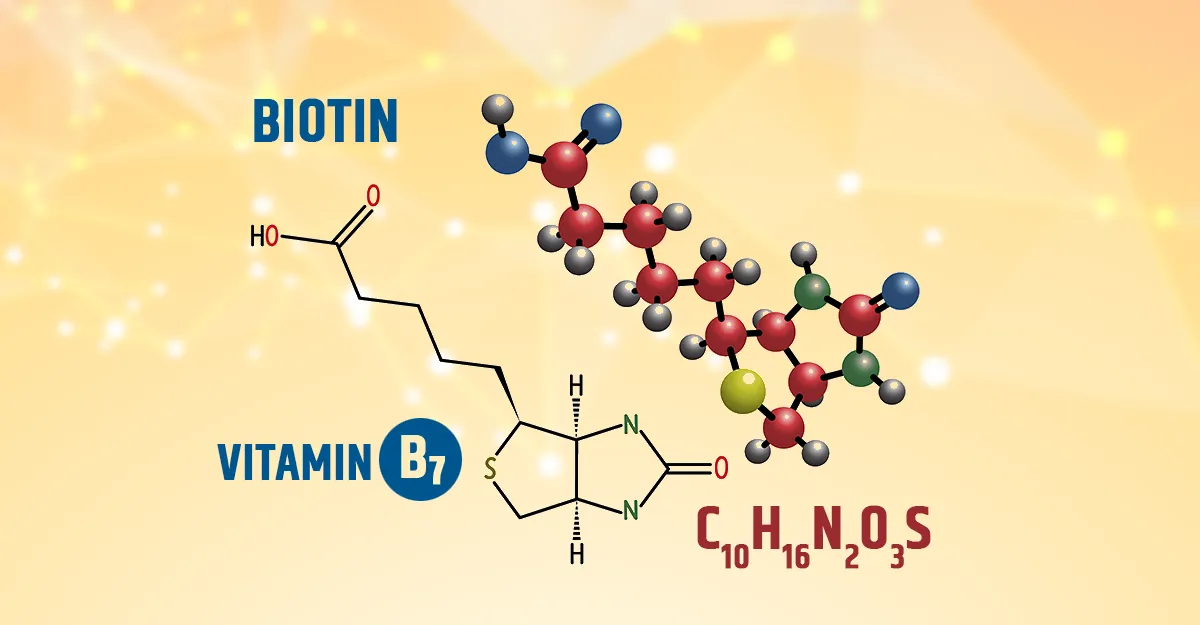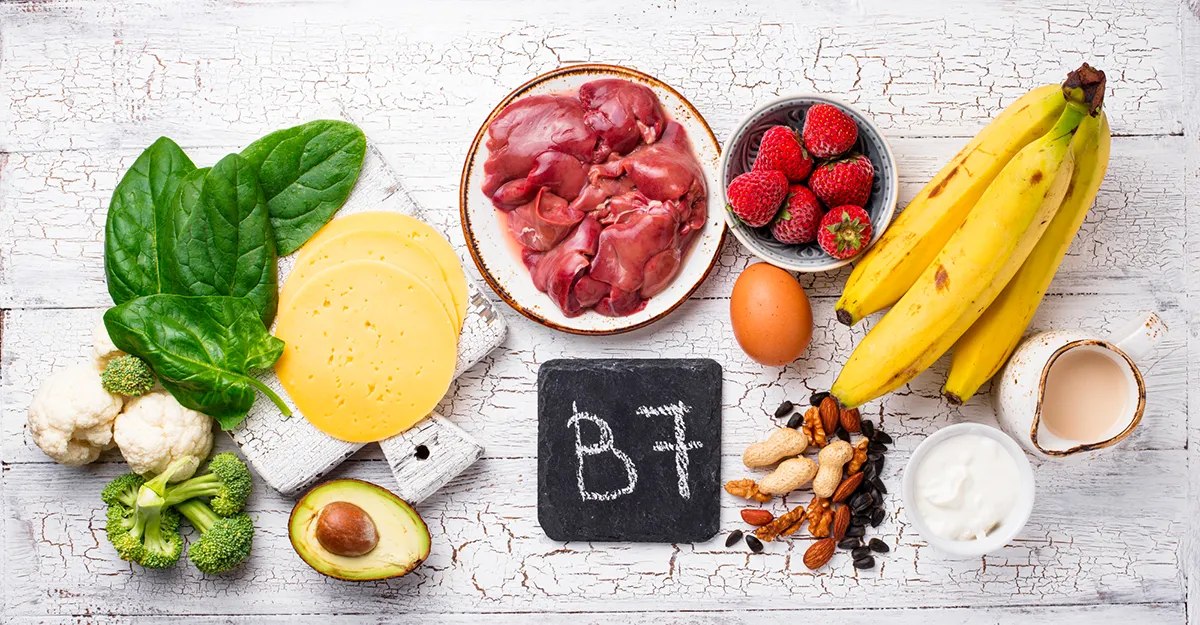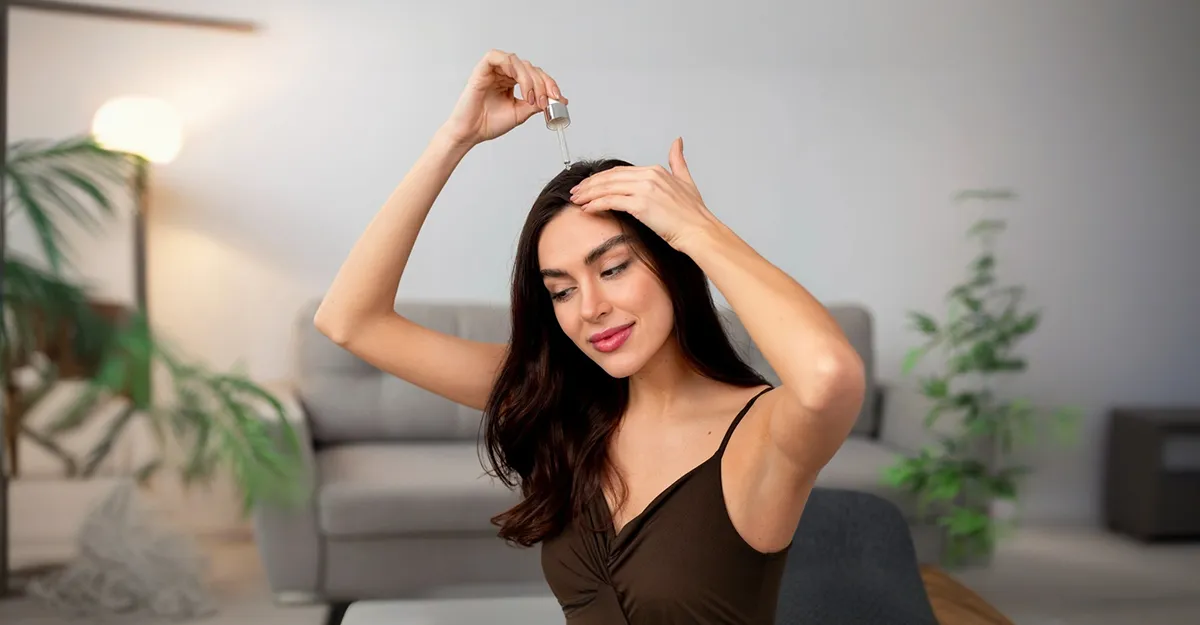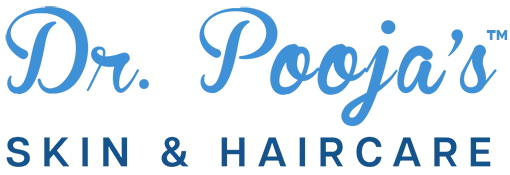Your cart is currently empty!

Biotin is a B-vitamin that plays a crucial role in giving us healthy skin, hair, and nails. Although it is mentioned mostly in connection with hair growth, benefits of biotin extend far beyond just that. In this article, I want to explore biotin and its awesome benefits for skin and hair care. No matter if you’re looking to improve your skin, boost hair growth, or simply enhance your overall well-being, biotin is definitely worth considering.
Table of Contents
What is Biotin and How Does it Work?
Biotin is a water-soluble vitamin belonging to the B-complex family. You may know it better as Vitamin B7 or Vitamin H. Biotin plays a vital role in converting nutrients into energy. It also helps in breaking down various nutrients like proteins, carbohydrates, and fats, making it an essential nutrient for overall health. Biotin is involved in many biological pathways responsible for maintaining healthy skin, hair, and nails. Biotin is found in a variety of food sources, including eggs, nuts, leafy greens, and whole grains. It’s also available in supplement form, which can be beneficial for those who are deficient or looking to boost their biotin intake.

Biotin is a well-known and effective ingredient for skin care. It offers a range of benefits, including:
- Skin elasticity and firmness: Biotin helps to strengthen the skin’s connective tissue, making it look more radiant and youthful.
- Skin hydration and moisture retention: Biotin helps to lock in moisture, leaving your skin feeling soft, supple, and hydrated.
- Fight acne and inflammation: Biotin has anti-inflammatory properties, which can help to reduce acne and soothe irritated skin.
- Skin texture and tone: Biotin helps to even out skin tone, reducing the appearance of fine lines and wrinkles.
Biotin is renowned for its ability to promote hair# Unlock the Power of Biotin: The Ultimate Guide to Radiant Skin and Hair Biotin, a B-complex vitamin, has been gaining popularity for its potential to transform skin and hair health. As a crucial nutrient, biotin plays a significant role in maintaining healthy skin, hair, and nails. In this article, we’ll delve into the world of biotin, exploring its benefits, uses, and how to incorporate it into your daily routine for radiant skin and hair.
Biotin’s helps to:
- Strengthen hair follicles and promote hair growth
- Improve skin elasticity and firmness
- Enhance skin hydration and moisture retention
- Support the growth of healthy nails
Benefits of Biotin for Skin Care
Biotin’s benefits for skin health are numerous. Some of the most significant advantages include:
- Improved skin elasticity and firmness: Biotin helps to strengthen skin cells, reducing the appearance of fine lines and wrinkles.
- Enhanced skin hydration and moisture retention: Biotin supports the skin’s natural barrier function, locking in moisture and leaving skin feeling soft and supple.
- Reduction in acne and inflammation: Biotin has anti-inflammatory properties, which can help to reduce acne and soothe irritated skin.
- Improved skin texture and tone: Biotin helps to even out skin tone, reducing the appearance of hyperpigmentation and leaving skin with a radiant glow.
For specific skin concerns, biotin can be beneficial in:
- Acne-prone skin: Biotin’s anti-inflammatory properties can help to reduce acne and prevent future breakouts.
- Aging skin: Biotin’s ability to improve skin elasticity and firmness can help to reduce the appearance of fine lines and wrinkles.
- Hyperpigmentation: Biotin can help to even out skin tone, reducing the appearance of dark spots and hyperpigmentation.
Benefits of Biotin for Hair Care
Biotin’s benefits for hair health are equally impressive. Some of the most significant advantages include:
- Promoting hair growth and strengthening hair follicles: Biotin helps to nourish hair follicles, promoting healthy hair growth and reducing hair loss.
- Improving hair texture and reducing breakage: Biotin helps to strengthen hair strands, reducing breakage and split ends.
- Enhancing hair shine and manageability: Biotin leaves hair looking healthy, shiny, and manageable.
- Reducing hair loss and thinning: Biotin can help to slow down hair loss and promote hair growth, reducing the appearance of thinning hair.
For specific hair concerns, biotin can be beneficial in:
- Brittle hair: Biotin’s ability to strengthen hair strands can help to reduce breakage and split ends.
- Dandruff and scalp irritation: Biotin’s anti-inflammatory properties can help to soothe and calm the scalp, reducing dandruff and irritation.
- Hair fall: Biotin can help to slow down hair loss and promote hair growth, reducing the appearance of thinning hair.
Biotin Deficiency
While biotin deficiency is rare, it can occur due to genetic disorders, excessive alcohol consumption, or certain medical conditions. Symptoms of biotin deficiency can include hair loss, skin rashes, brittle nails, and neurological issues. If you suspect you have a biotin deficiency, it’s crucial to consult a healthcare professional for diagnosis and treatment.
Biotin Sources

Most people can obtain sufficient biotin through a balanced diet . Some of the best dietary sources of biotin include:
- Organ meats: Liver, kidney
- Eggs: Especially the yolk
- Fish: Salmon, tuna
- Meat: Beef, pork
- Seeds: Sunflower seeds, almonds
- Nuts: Walnuts, peanuts
- Vegetables: Sweet potatoes, avocados
- Dairy products: Milk, cheese, yogurt
Biotin Supplements
If you’re considering taking biotin supplements, it’s essential to consult with a healthcare professional to determine if they are necessary and to discuss appropriate dosage. Biotin supplements are available in various forms, including capsules, tablets, and gummies. When choosing a supplement, look for reputable brands that undergo third-party testing to ensure quality and purity.
How to Incorporate Biotin into Your Skin and Hair Care Routine

Incorporating biotin into your daily routine can be simple. Here are some ways to get started:
- Dietary changes: Eat biotin-rich foods, such as nuts, seeds, eggs, and whole grains.
- Supplements: Take a biotin supplement in capsule or tablet form, following the recommended dosage.
- Topical applications: Use biotin-infused products, such as serums, creams, and shampoos, to target specific skin and hair concerns.
When choosing biotin products, look for:
- Reputable brands: Opt for well-known brands that use high-quality ingredients.
- Effective concentrations: Choose products with effective concentrations of biotin (usually between 1,000-5,000 mcg).
- Combination products: Consider products that combine biotin with other nourishing ingredients, such as vitamin E, keratin, or collagen.
Precautions, Interactions, and Potential Side Effects
While biotin is generally considered safe, there are some precautions to be aware of:
- Interactions with medications: Biotin can interact with certain medications, such as blood thinners and cholesterol-lowering medications.
- Allergic reactions: Some individuals may be allergic to biotin, so start with a small amount and monitor your body’s response.
- Pregnancy and breastfeeding: While biotin is generally considered safe during pregnancy and breastfeeding, it’s essential to consult with your healthcare provider before taking any supplements.
- High doses: Taking high doses of biotin (above 5,000 mcg) can cause skin rashes, hair loss, and other adverse effects.
To minimize potential side effects, follow these guidelines:
- Start with a low dose: Begin with a low dose (1,000-2,000 mcg) and gradually increase as needed and under medical supervision.
- Monitor your body’s response: Pay attention to any changes in your skin, hair, or overall health, and adjust your biotin intake accordingly.
- Consult with a healthcare professional: If you have any underlying medical conditions, are taking medications, or have concerns about biotin supplementation, consult with a healthcare professional for personalized advice.
Conclusion
Biotin is a powerful nutrient that offers a range of benefits for skin and hair health. By incorporating biotin into your daily routine, you can:
- Improve skin elasticity and firmness
- Enhance skin hydration and moisture retention
- Promote hair growth and strengthen hair follicles
- Reduce acne, inflammation, and hair loss
Remember to choose high-quality biotin products, follow the recommended dosage, and consult with a healthcare professional if you have any concerns. With biotin, you can unlock the power to achieve radiant, healthy-looking skin and hair.
For all around skin and hair care, explore our Trqois Terra products. You can check out Dr. Pooja’s Trqois Terra Scalp & Hair Rescue Serum which uses Kudzu extract among other nature-based active ingredients to reduce greying and other aging related hair damage.
Frequently Asked Questions (FAQs)
- Q: What is the recommended daily intake of biotin? A: The recommended daily intake of biotin varies from 2,500-3,000 mcg per day.
- Q: Can I take biotin with other supplements? A: Yes, biotin can be taken with other supplements, but it’s essential to consult with a healthcare professional to avoid interactions.
- Q: How long does it take to see results from biotin supplementation? A: Results from biotin supplementation can vary, but most people notice improvements in skin and hair health within 3-6 months.
- Q: Can biotin help with nail health? A: Yes, biotin is also beneficial for nail health, helping to strengthen nails and improve their texture and appearance.
- Q: Is biotin suitable for all skin types? A: Yes, biotin is suitable for all skin types, including sensitive skin, but it’s always recommended to do a patch test before using any new skincare product.
- Q: Can biotin be used to treat hair loss caused by underlying medical conditions? A: While biotin can help promote hair growth, it’s essential to consult with a healthcare professional to address underlying medical conditions that may be causing hair loss.
- Q: How does biotin interact with other hair growth products? A: Biotin can be used in conjunction with other hair growth products, such as minoxidil or keratin supplements, but it’s crucial to consult with a healthcare professional to avoid interactions and ensure safe use.
- Q: Can I get enough biotin from food sources alone? A: While it’s possible to get some biotin from food sources, such as eggs, nuts, and whole grains, supplementing with biotin can help ensure adequate intake, especially for those with dietary restrictions or deficiencies.
More from the blog
- 5 Powerful Menopause Skincare Secrets Revealed
- 5 Powerful Ways to Stop Teen Hair Fall
- 5 Vital Shopping Tips for Skincare Products
- 5 Effective Solutions for Neck Pigmentation
- 5 Effective Ways to Stop Excessive Sweating (Hyperhidrosis)
Recommended Topics
Popular Tags
40s aging hair care biotin choosing right cobalamin collagen dry itchy skin excessive sweating excess vitamin hair care hair care in 40s hair fall hair health hair loss treatment hydroquinone hyperhidrosis menopause menopause skincare menopause skin care minoxidil neck darkening neck pigmentation perimenopause scalp allergy scalp allergy treatment scalp health shampoo shampooing side effects skin care skincare skincare products skin health sunscreen supplement safety sweating problem teen hairfall teen hair thinning too much sweat tretinoin vitamin b12 vitamin d vitamin overdose washing hair wrinkles












Leave a Reply